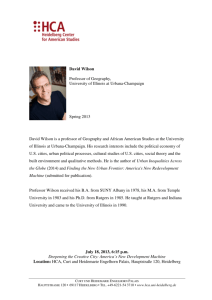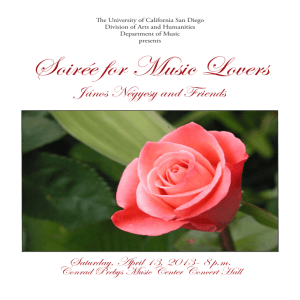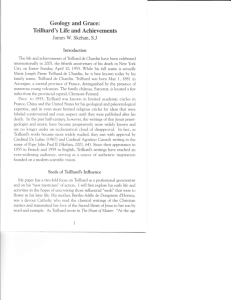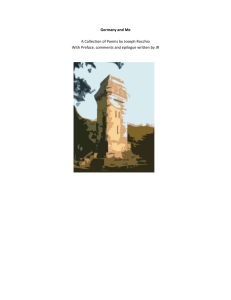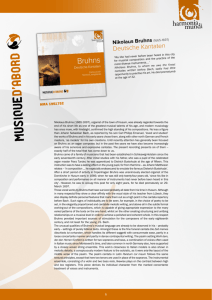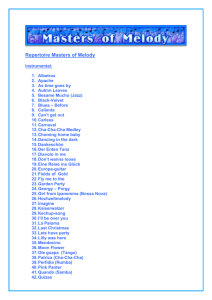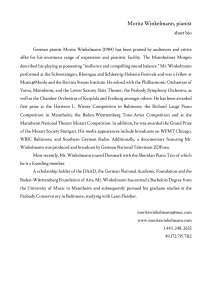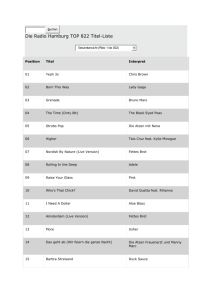MS Word 97 format ()
advertisement
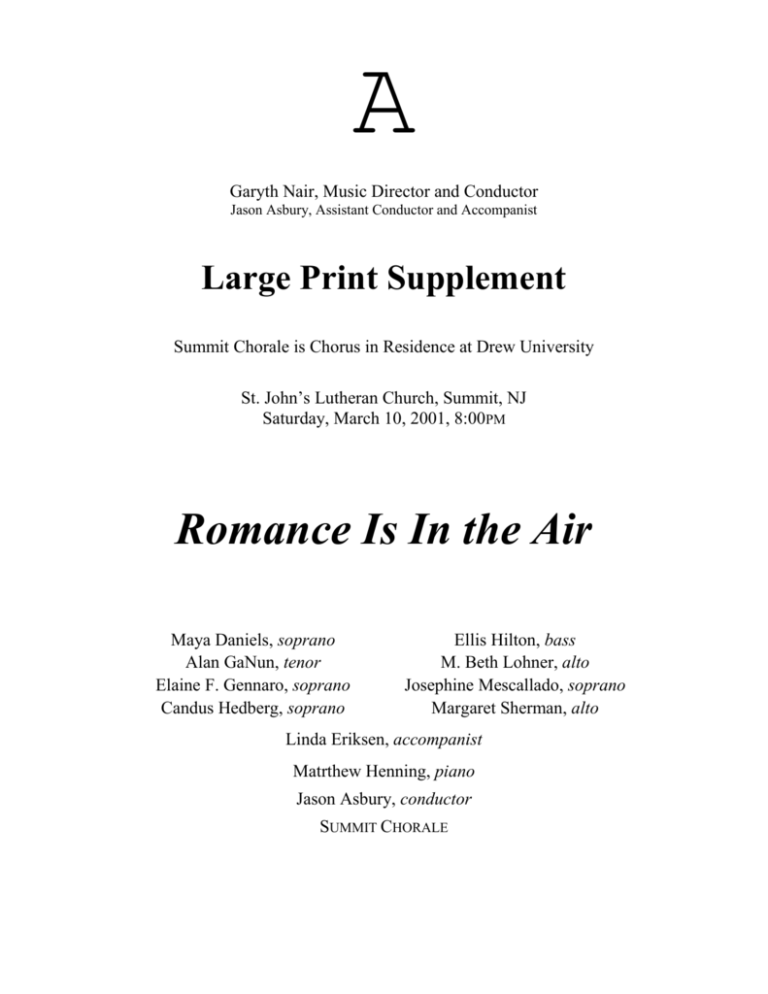
A Garyth Nair, Music Director and Conductor Jason Asbury, Assistant Conductor and Accompanist Large Print Supplement Summit Chorale is Chorus in Residence at Drew University St. John’s Lutheran Church, Summit, NJ Saturday, March 10, 2001, 8:00PM Romance Is In the Air Maya Daniels, soprano Alan GaNun, tenor Elaine F. Gennaro, soprano Candus Hedberg, soprano Ellis Hilton, bass M. Beth Lohner, alto Josephine Mescallado, soprano Margaret Sherman, alto Linda Eriksen, accompanist Matrthew Henning, piano Jason Asbury, conductor SUMMIT CHORALE PROGRAM I Mendelssohn and Schubert Lerchengesang, Op. 48, No. 4 Der Tanz, D. 826 Geist der Liebe, D. 747 Felix Mendelssohn (1809-1847) Franz Schubert (1797-1828) Franz Schubert Men of Summit Chorale Ständchen, D. 920a Franz Schubert solo: Ms. Daniels Men of Summit Chorale II Robert Schumann (1810-1856) from Spanisches Liederspiel, Op. 74 No. 5 Es ist verrathen No. 2 Intermezzo Men of the Camerata No. 8 Botschaft Women of the Camerata No. 9 Ich bin geliebt The Camerata III Fanny Mendelssohn Hensel (1805-1847) Schweigend sinkt die Nacht Waldeinsam soli: Ms. Mescallado, Ms. Sherman, Mr. GaNun, Mr. Hilton IV Hugo Wolf (1860-1903) Der Feuerreiter — INTERMISSION — (15 Minutes) V Johannes Brahms (1833-1897) from Neue Liebeslieder, Op. 65 No. 14 Flammenauge soli: Ms. Gennaro, Ms. Lohner No. 5 Wahre solo: Ms. Hedberg No. 13 Nein, Geliebter Women of Summit Chorale No. 8 Weiche Gräser No. 7 Vom Gebirge VI More Brahms from Waltzes, Op. 39 (for piano with four hands) No. 1 No. 7 No. 4 No. 15 No. 14 Ms. Eriksen and Mr. Henning, piano VII Still More Brahms Fragen, Op. 64, No. 3 An die Heimat, Op. 64, No. 1 Tafellied, Op. 93b Kleine Hochzeits-Kantate Funding has been made possible in part by the New Jersey State Council on the Arts, Department of State, through a grant administered by the Union County Division of Cultural and Heritage Affairs. SUMMIT CHORALE appeals to parents to assist their children in developing courteous audience behavior. ••• Please turn off all electronic noisemakers, including pagers, cell phones, wristwatch alarms and the like which may disturb other audience members during the performance. ••• Please do not use cameras requiring flash during the performance. ••• The use of recording equipment, including audio and video recorders, is strictly prohibited during the performance. ••• Please refrain from smoking anywhere in this building. It’s never too late to help! Please help us continue to bring the best in choral musical programming and performance to you, your family and friends. Become a SUMMIT CHORALE Patron for 2000-2001 by mailing your check, payable to: SUMMIT CHORALE P.O. Box 265; Summit, NJ 07902-0265 Thank you! Information filed with the Attorney General concerning this charitable solicitation may be obtained from the Attorney General of the State of New Jersey by calling (973)504-6251. Registration with the Attorney General does not imply endorsement. Questions? Want more information about SUMMIT CHORALE? Call (973) 762–8486 write us P.O. Box 265; Summit, NJ 07902-0265 or visit us online http://www.summitchorale.org TEXTS & TRANSLATIONS Lerchengesang (Lark’s Song) Wie lieblicher Klang, O Lerche, dein Sang! er hebt sich, er schwingt sich in Wonne. Du nimmst mich von hier, ich singe mit dir, wir steigen durch Wolken zur Sonne. How lovely a sound, oh lark, is your song! It soars, it rises in bliss. You take me away, I sing with you, we climb through clouds toward the sun. Der Tanz (The Dance) Es redet und träumet die Jugend so viel, von Tanzen, Galloppen, Gelagen, auf einmal erreicht sie ein trügliches Ziel, da hört man sie seufzen und klagen. Youth all too often talk and dream about dancing, galloping, and drinking. when suddenly, they reach a deceptive goal as one hears them sighing, complaining; Bald schmerzet der Hals, und bald schmerzet die Brust, verschwunden ist alle die himmlische Lust. Now acheth the neck, and now acheth the chest, vanished is all that heavenly joy. „Nur diesmal noch kehr’mir Gesundheit zurück!“ so flehet vom Himmel der hoffende Blick! “Restore good health to me only this once,” their hopeful glance beseeches Heaven. Geist der Liebe (Spirit of Love) Der Abend schleiert Flur und Hain in traulich holde Dämm’rung ein, hell flimmt, wo gold’ne Wölkchen zieh’n, der Stern der Liebeskönigin. Evening veils meadow and bush with intimate, lovely dusk, brightly shines, where golden clouds float, the star of love’s queen. Die Wogenfluth hallt Schlummerklang, die Bäume lispeln Abendsang, der Wiese Gras umgaukelt lind mit Sylphenkuß der Frühlingswind. The surf reflects a sleepy sound, trees whisper an evening song, a spring breeze gently flutters about the meadow’s grass, like a sylph’s kiss. Der Geist der Liebe wirkt und strebt, wo nur ein Puls der Schöpfung bebt, im Strom, wo Wog’ in Woge fließt, im Hain, wo Blatt an Blatt sich schließt. The spirit of love works and strives, wherever creation’s pulse trembles, in the river, where wave flows upon wave, in the bush, where leaf is close to leaf. O Geist der Liebe, führe du dem Jüngling die Erkor’ne zu, ein Minneblick der Trauten hellt mit Himmelsglanz die Erdenwelt. O spirit of love, may you guide the chosen one to the young man, a loving glance of the beloved brightens the earth with heaven’s gleam. Ständchen (Serenade) Zögernd, leise, in des Dunkels nächt’ger Hülle sind wir hier. Und der Finger sanft gekrümmt, leise, pochen wir an des Liebchens Kammertür. Hesitant, quiet, in the night’s dark stillness we are here. And with gently crooked finger, softly, we knock on our sweetheart’s chamber door. Doch nun steigend, schwellend, hebend mit vereinter Stimme laut, rufen aus wir hochvertraut: schlaf’ du nicht, wenn der Neigung Stimme spricht! But now, rising, swelling, our united voices raising, we call, loudly, confidently: “Do not sleep when the voice of love speaks!” Sucht’ ein Weiser nah’ und ferne Menschen einst mit der Laterne. Wie viel seltner dann als Gold Menschen uns geneigt und hold. Drum wenn Freundschaft Liebe spricht, Freundin, Liebchen, schlaf’ du nicht! If a sage once searched for humans near and far with lantern shining. How much rarer it is than gold to find someone affectionate and gracious. So when friendship speaks of love, Dearest, Darling, do not sleep! Aber was in allen Reichen war dem Schlummer zu vergleichen? Drum statt Worten und statt Gaben sollst du nun auch Ruhe haben. Noch ein Grüßchen, noch ein Wort, es verstummt die frohe Weise. Leise, schleichen wir uns wieder fort. But what in all the world can be compared to slumber? So, instead of words and gifts, you shall now have peace. One more little greeting, one more word, then the gay tune dies away. Softly, we steal away again. Es ist verrathen (It is revealed) Daß ihr steht in Liebesgluth, Schlaue, läßt sich leicht gewahren. Refrain: Und die Wangen offenbaren, was geheim im Herzen ruht. That you are burning with love’s glow, clever one, is noticed easily. Refrain: And your cheeks disclose what secretly rests in your heart. Stets an Seufzern sich zu weiden, stets zu weinen statt zu singen, wach die Nächte hinzubringen und den süßen Schlaf zu meiden; das sind Zeichen jener Gluth, die dein Antlitz läßt gewahren. Refrain Always to enjoy deep sighing, always to cry instead of singing, to spend your nights waking, and to avoid sweet sleep; these are signals of the glow that your countenance reveals. Refrain Liebe, Geld und Kummer halt’ ich für am schwersten zu verhehlen, denn auch bei den strengsten Seelen drängen sie sich vor gewaltig. Jener unruhvolle Muth läßt zu deutlich sie gewahren. Refrain I consider love, money, and sorrow, as the most difficult to hide, for even in the sternest souls they strongly rush to the fore. That restless spirit betrays them all too openly. Refrain Intermezzo Und schläfst du, mein Mädchen, auf! öffne du mir, denn die Stund’ is gekommen, da wir wandern von hier, Though you may be sleeping, my girl, Awake, open the door for me, For the hour has arrived, When we walk away from here; und bist ohne Sohlen, leg’ keine dir an, durch reißende Wasser geht unsere Bahn, durch die tief, tiefen Wasser des Guadalquivir, denn die Stund’ ist gekommen, da wir wandern von hier, auf! öffne du mir! if you are wearing no shoes, don’t put any on, our path will lead through rapid waters, through the deep, deep waters of the Guadalquivir, for the hour has arrived, when we walk away from here; awake, open the door for me! Botschaft (Message) Nelken wind’ ich und Jasmin, und es denkt mein Herz an ihn. I’m twining carnations with jasmin and my heart thinks of him. Nelken all’, ihr flammenrothen, die der Morgen mir beschert, zu ihm send’ ich euch als Boten jener Gluth, die mich verzehrt, und ihr weißen Blüthen werth, sanft mit Düften grüßet ihn, sagt ihm, daß ich bleich vor Sehnen, daß auf ihn ich harr’ in Thränen! Oh, you fiery red carnations which each morning gives to me, I send you as messengers to him, of the fire that consumes me, and you precious blossoms, white, with your fragrance gently greet him; tell him that I’m pale with yearning, that for him I’m waiting in tears. Tausend Blumen thauumfloßen find’ ich neu im Thal erwacht, alle sind erst heut’ entsproßen, aber hin ist ihre Pracht, wenn der nächste Morgen lacht. Sprich, du duftiger Jasmin, sprecht, ihr flammenrothen Nelken, sprecht, kann so schnell auch Liebe welken? Ach, es denkt mein Herz an ihn! A thousand blossoms, damp with dew, I find newly awakened in the valley, all of them blooming just today, their splendor vanished when another morning dawns. Speak, fragrant jasmin, speak, you flaming red carnations, speak can love wither just as fast? Ah, my heart thinks of him! Ich bin geliebt (I am loved) Mögen alle bösen Zungen immer sprechen, was beliebt: Refrain: Wer mich liebt, den lieb’ ich wieder, und ich weiß, ich bin geliebt! Let all evil tongues speak whatever they may want: Refrain: Him who loves me, I love in return, and I know that I am loved! Schlimme, schlimme Reden flüstern eure Zungen schonungslos, doch ich weiß es, sie sind lüstern nach unschuld’gem Blute blos. Nimmer soll es mich bekümmern, schwatzt so viel es euch beliebt; Refrain Evil, evil gossip whisper your tongues mercilessly, but I know they only lust after innocent blood. Never shall it bother me, babble to your hearts’ content; Refrain continued … Zur Verläeumdung sich verstehet, nur wem Lieb’ und Gunst gebach, weil’s ihm selber elend gehet und ihn niemand nimmt und mag, darum denk’ ich, daß die Liebe, drum sie schmäh’n, mir Ehre giebt; Refrain Only he is skilled in slander who lacks being favored, loved, since he himself is so wretched and no one woos and wants him. That’s why I think that love, which they revile, gives me honor; Refrain Wenn ich wär’aus Stein und Eisen, möchtet ihr darauf besteh’n, daß ich sollte von mir weisen Liebesgruß und Liebesfleh’n; doch mein Herzlein ist nun leider weich, wie’s Gott uns Menschen giebt. Refrain If I were made of stone and iron, you might insist that I should reject love’s greeting and love’s pleas. But, unfortunately, my little heart is soft, as God gives it to us humans. Refrain Schweigend sinkt die Nacht (Silently Descends the Night) Schweigend sinkt die Nacht hernieder, still verglimmt des Abends Pracht, leis’ verklingen unsre Lieder, leiser klingt die Welle wieder, unsre Fahrt, sie ist vollbracht, leise, leise, gute Nacht. Silently descends the night, silently evening’s splendor dies out, softly our songs ebb away, softer yet, the waves retreat, our journey, it is ended, softly, softly, good night. Waldeinsam (Forest Solitude) Wie hoffnungsgrün ist rings die Welt, ein strahlend’ Blühn, ein Glanz und Glühn, vom Boden bis zum Himmelszelt. How green with hope the world around, radiant blooming, splendor, glow, from forest depth to heaven’s heights. Allmächtig schallt durch Blüth’ und Baum, und wieder wallt und widerhallt der Liebe goldner Morgentraum Love’s golden morning dream sounds mightily through bloom and tree, resounds again, reverberates. Waldeinsamkeit so rings und rund, so ruhend weit, vertraut, befreit, ertöne Lied von meinem Mund. Forest solitude surrounding me, so deeply restful, intimate, set free, break forth, song, from my mouth. Thanks to Heinz D. Roth and Robin Taylor Roth for their invaluable assistance with the translation Der Feuerreiter (The Fire-Rider) Sehet ihr am Fensterlein dort die rote Mütze wieder? nicht geheuer muß es sein, denn er geht schon auf und nieder, Und auf einmal welch Gewühle bei der Brücke, nach dem Feld! Horch! das Feuerglöcklein gellt: hinter’m Berg, hinter’m Berg, brennt es in der Mühle! Do you see at the window the red cap there again? There must be something wrong, for it’s moving up and down. And suddenly what an uproar near the bridge, beyond the field! Listen! the fire bell shrills Behind the mountain, behind the mountain, there’s a fire in the mill! Schaut! da sprengt er wütendh schier durch das Thor, der Feuerreiter, auf dem rippendürren Thier, als auf einer Feuerleiter! Querfeldein! durch Qualm und Schwüle rennt er schon und ist am Ort! Drüben schallt es fort und fort: hinter’m Berg, hinter’m Berg, brennt es in der Mühle! Look! there he gallops furiously through the gate, the fire-rider, on his beast, thin as a lath, as if on a fire-ladder. Across the field, through smoke and heat, he hurries and reaches the spot. Beyond, the noise goes on and on: Behind the mountain, behind the mountain, there’s a fire in the mill! Der so oft den roten Hahn meilenweit von fern gerochen, mit des heil’gen Kreuzes Spahn freventlich die Gluth besprochen — Weh! Dir grinst vom Dachgestühle dort der Feind im Höllenschein. Gnade Gott der Seele dein! hinter’m Berg, hinter’m Berg, rast er in der Mühle! He who often smelt the fire, from afar, from miles away, and with a splinter of the Holy Cross, blasphemously conjured up the blaze – Woe to you! from the rafters grins the fiend at you in light infernal. May God have mercy on your soul! Behind the mountain, behind the mountain, he’s raging in the mill! Keine Stunde hielt es an, bis die Mühle borst in Trümmer; doch den kecken Reitersmann sah man von der Stunde nimmer. Volk und Wagen im Gewühle kehren heim von all dem Graus; auch das Glöcklein klinget aus: hinter’m Berg, hinter’m Berg, brennt’s! — It didn’t take an hour before the mill burst into ruins; but the daring horseman was not seen again from that hour on. People and wagons in confusion return home from all the horror; the bell dies away, too: Behind the mountain, behind the mountain, there’s a fire! – Nach der Zeit ein Müller fand ein Gerippe sammt der Mützen aufrecht an der Kellerwand auf der beiner’n Mähre sitzen: Feuerreiter, wie so kühle reitest du in deinem Grab! Husch! da fällt’s in Asche ab. Ruhe wohl, ruhe wohl drunten in der Mühle! Afterwards a miller found a skeleton with its cap upright on the cellar wall sitting on the bones of a mare. Fire-rider, how coolly you ride in your grave! Sh! it collapses into ashes. Rest in peace, rest in peace down there in the mill! Flammenauge (Fiery Eye) Flammenauge, dunkles Haar, Knabe wonnig und verwogen. Kummer ist durch dich hinein, in mein armes Herz gezogen! Fiery eye, dark hair, lovely and bold youth, grief has entered, due to you, into my poor heart. Kann in Eis der Sonne Brand? Sich in Nacht der Tag verkehren? Kann die heiße Menschenbrust athmen ohne Glut begehren? Can the sun’s fire turn to ice? Can day change into night? Can the ardent human breast breathe without glowing desire? Ist die Flur so voller Licht, daß die Blum im Dunkel stehe? Ist die Welt so voller Lust, daß das Herz in Qual vergehe? Is the field so full of light that the flower stands in darkness? Is the world so full of mirth, that the heart in torment perishes? Wahre (Guard) Wahre, wahre deinen Sohn, Nachbarin, vor Wehe. Weil ich ihn mit schwarzem Aug’ zu bezaubern gehe. Guard, oh guard your son oh neighbor, from harm, for I will, with my dark eyes, bewitch him. O wie brennt das Auge mir, das zu zünden fordert! Flammet ihm die Seele nicht deine Hütte lodert. Oh, how my eye burns demanding to enflame him! If his soul is not kindled, your hut shall catch fire. Nein, Geliebter (No, Beloved) Nein, Geliebter, setze dich mir so nahe nicht! Starre nicht so brünstiglich mir in’s Angesicht. No, Beloved, do not sit so close to me! Do not stare so fervently into my face. Wie es auch im Busen brennt, dämpfe, dämpfe deinen Trieb, daß es nicht die Welt erkennt wie wir uns so lieb, so lieb. Even though your bosom may burn, Subdue, subdue your longings, lest the world shall recognize how dear we are to each other. Weiche Gräser (Soft Grasses) Weiche Gräser im Revier, schöne stille Plätzchen! O wie linde ruht es hier sich mit einem Schätzchen! Soft grasses in the woods, lovely quiet little places! Oh, how gently one can rest with a sweetheart, here! Vom Gebirge (From the Mountains) Vom Gebirge Well’ auf Well’ kommen Regengüße. Und ich gäbe dir so gern hundert, tausend Küße. From the mountains, wave on wave, rush torrents of rain and I’d love to shower you with a hundred thousand kisses. Fragen (Questions) Mein liebes Herz, was ist dir? Ich bin verliebt, das ist mir. Wie ist dir denn zu Mut? Ich brenn in Höllenglut. Erquicket dich kein Schlummer? Den litte Qual und Kummer? Gelingt kein Widerstand? Wie doch bei solchem Band? Ich hoffe, Zeit wirds wenden, Es wirds der Tod nur enden. Was gäbst du, sie zu sehn? Mich, dich, Welt, Himmelshöhn. Du redest ohne Sinn! Weil ich in Liebe bin. Du mußt vernünftig sein, Das heißt, so kalt wie Stein. Du wirst zu Grunde gehen! Ach, möcht es bald geschehen! My dearest heart, what ails thee? I am in love, that ails me. How is your spirit then? Hell’s flames burn in my heart. Will slumber soothe your sorrows? Do pain and sorrow allow slumber? Why can you not resist? How could I, with these ties? I hope that time will change it. There’s naught but death can end it. What would you give to see her? Me, you, earth, heaven’s heights. You’re speaking without sense! Because I am in love. You must be rational! That is, as cold as stone. You’ll surely go to ruin! If only it happened soon! An die Heimat (To My Homeland) Heimat! Wunderbar tönendes Wort! Wie auf befiederten Schwingen ziehst du mein Herz zu dir fort. Jubelnd, als müßt ich den Gruß jeglicher Seele dir bringen, trag ich zu dir meinen Fuß, freundliche Heimat! Homeland! Wonderful sounding word! As on the wings of a bird you draw my heart close to you. Joyful, as though I must bring greetings from everyone, I turn my steps now to you, welcoming homeland! Bei dem sanft klingenden Ton wecken mich alte Gesänge, die in der Ferne mich flohn; rufen mir freudenvoll zu heimatlich lockende Klänge: du nur allein bist die Ruh, schützende Heimat! With gentle, melodious tone old songs awaken me that vanished in lands far away; joyfully they call out to me native alluring sounds: you, only you offer calm, protecting homeland! Gib mir den Frieden zurück, den ich im Weiten verloren, gib mir dein blühendes Glück! Unter den Bäumen am Bach, wo ich vor Zeiten geboren, gib mir ein schützendes Dach, liebende Heimat! Grant me once more the peace that I had lost far away, grant me your blossoming joy! Under the trees by the brook, where I was born ages ago, grant me a safe dwelling place, loving homeland! Tafellied (Table Song) Die Frauen Gleich wie Echo frohen Liedern fröhlich Antwort geben muß, so auch nah’n wir und erwiedern dankend den galanten Gruß. The Ladies Just as Echo always answers cheerfully to cheerful songs, so we come and reply with thanks to the gallant greeting. Die Männer O, ihr Güt’gen und Charmanten! Für des Echos holden Schwung nehmt der lust’gen Musikanten ganz ergeb’ne Huldigung. The Gentlemen O you fair and charming ladies! For Echo’s lovely ardor accept the merry musicians’ fully devoted reverence. Die Frauen Doch ihr huldigt, will’s uns dünken, andern Göttern nebenbei! Roth und golden seh’n wir’s blinken sagt, wie das zu nehmen sei? The Ladies But it seems to us that other gods enjoy your homage too. Red and gold we see it gleaming, speak, how shall we deal with this? Die Männer Theure! zierlich mit drei Fingern, sich’rer mit der ganzen Hand und so füllt man aus den Dingern’s Glas nicht halb, nein, bis zum Rand. The Gentlemen Dearest, with three graceful fingers, with the whole hand more secure, that is how you fill the glasses not half full, but to the rim. Die Frauen Nun, wir sehen, ihr seid Meister; doch wir sind heut’ liberal; hoffentlich, als schöne Geister, treibt ihr’s etwas ideal. The Ladies Well, we see that you are experts; but we’re tolerant today; hopefully, as handsome spirits, you’ll strive for noble goals. Die Männer Jeder nippt und denkt die Seine; und wer nichts Besond’res weiß: Nun, der trinkt in’s Allgemeine frisch zu aller Schönen Preis! The Gentlemen Each one sips to his fair lady, and who lacks that special one, well, he’ll drink more generally, to the praise of all ladies fair! Alle Recht so! Klingt denn in die Runde an zu Dank und Gegendank! Sänger, Frau’n, wo die im Bunde, da giebt’s einen hellen Klang! Everyone Well done! Let's join in a round of thanks and counter-thanks! Singers, ladies, joined together raise a truly pleasing sound! Kleine Hochzeits-Kantate (Little Wedding Music) Zwei Geliebte, treu verbunden gehen durch die Welt spazoren. Jedes hat sein Herz verloren, doch das Andre hats gefunden. Two lovers, truly joined, promenade throughout the world. Each of them has lost his heart, but the other one has found it. Jeder trägt die leichte Last wie die Uhr am Kettchen fast. Also gehts auf Steg und Wegen ruhig fort mit gleichen Schlägen. Each one bears an easy load, fastened as the watch to the chain. Thus ‘t goes forth, through path and byways, silently on even keel. „Schau, die könnens!“ sagen ferne an der Himmelshöh’ die Sterne, „Wer sind sie?“ Gleich schrein wir da: Sigmund und Emilia! “Look, they know how!” the stars say in the distant firmament, “Who are they?” Right away, at that we yell: Sigmund and Emilia! NOTES ON THE PROGRAM by Mary W. Helms Romance is in the Air features music about love, but also celebrates the Romantic Movement that swept over Europe in the 19th century. Particularly in German-speaking lands, a literary revival attracted the interest of composers who began using these texts to express emotional states in music, developing new ways of conveying feelings in song on such subjects as nature, death, fear, friendship and, of course, the many manifestations of love. Whether passionate and dramatic, poignant and meditative, or genial and cheerful, they offer some of the most tuneful and heartfelt music ever written. I Felix Mendelssohn (1809-1847) was among the most gifted musicians of the 19th century and one of the most remarkable child prodigies of any era. He wrote successfully in every genre but opera. In addition to composing, however, he was among the busiest musicians in Europe: conducting, teaching, performing on the piano and organ, organizing and directing music festivals and other concerts. He never completely recovered from the sudden death of his beloved sister Fanny (see below) and outlived her by less than six months. In addition to his sacred oratorios, cantatas and hymns, Mendelssohn composed a variety of lighter works for the voice. Part-songs like Lerchengesang are typical products of the Romantic Era’s fondness for amateur singing societies and for music in the home. Sometimes they were sung “in the open air” as the singers took walks together after performing more serious works. According to his biographer George Marek, Franz Peter Schubert (1797-1828) was a man “haunted, plagued, pushed by his talent.” His rate of composition was phenomenal; in his short life he wrote symphonies, chamber music, and a vast quantity of piano music. He was also a man in love with the human voice, to whom “song was the fundamental and natural medium of musical expression.” In Schubert’s Vienna as in Mendelssohn’s Leipzig and Berlin, a few hostesses were famous for their musical salons, but even in ordinary middle-class homes, friends gathered informally around the pianoforte to try out the latest compositions. Schubert was a frequent participant as accompanist and singer; in fact, those evenings devoted exclusively to his music came to be known as Schubertiads. Irene von Kiesewetter, young daughter of the vice-president of the Philharmonic Society, occasionally accompanied Schubert at such gatherings. The delightfully rollicking Der Tanz, also called “Cantata für Irene Kiesewetter,” was probably commissioned by her father with the intent of combating her passion for dancing (although it must have had the opposite effect). Its original text, by Kolumban Schnitzer, included a direct reference to Irene in a second verse omitted when the piece was first published in 1892. Works for male voices represent a considerable body of Schubert’s choral music and, as musicologist Alfred Einstein noted, he “struck the keynote for the male-voice chorus for the hundred years that followed.” Composed in January 1822, the lovely Geist der Liebe sets four voice parts accompanied by piano or guitar to a text by Friedrich von Matthisson (1761-1831) typical of the Romantic connection of love with nature. In Ständchen the would-be lover first tries to waken his beloved with a gift of song then, recognizing that sleep is also a gift, steals away. As the supporting voices softly accompany the pleas of the lover, the piano illustrates the tiptoed steps of the serenaders. This is an “occasional” composition commissioned by Anna Fröhlich in the summer of 1827 to mark the birthday of her pupil Louise Gosmar. Within three days of her request Schubert presented her with a setting for mezzo-soprano and four male voices of the poem by Franz Grillparzer (1791-1872) but, since it was intended for Fräulein Gosmar’s female friends to sing, Schubert had to rewrite the piece. Summit Chorale presents the original version. II Robert Schumann (1810-1856) not only composed successfully for piano, orchestra, and voice, but also founded the influential music journal Neue Zeitschrift für Musik, serving as its editor and leading writer for nearly ten years. Schumann’s long courtship of Clara Wieck is a familiar romantic story. An enormously gifted performer and a composer in her own right, Clara became Robert’s wife only after a protracted legal struggle with her father. Marriage provided Robert with the impetus for great creative activity and Clara premiered many of his works. Most of Schumann’s adult life was marked by periods of recurring depressive illness leading to creative lapses, followed by periods of hectic activity. Eventually his illness forced him into an asylum where he died two years later. In general, Schumann’s song writing carries the genre a step beyond Schubert. In Schumann’s songs, the piano becomes a true equal of the voice, not only complementing the text, but also commenting on what is unsaid or referred to by allusion. The Spanisches Liederspiel is one of Schumann’s most important song cycles. Composed during 1849, its first completed portions were premiered at one of Clara’s recitals on April 29 of that year. The texts come from Emanuel Geibel (1815-1844), a poet whose translations and paraphrases of Spanish poetry attracted not only Schumann, but other composers, notably Hugo Wolf. As lieder specialist Dietrich Fischer-Dieskau comments, Schumann imbued these songs with a “richness of color and a fiery temperament that express well their southern European flavor.” The cycle describes a love story, from the first bashful encounter to assured happiness. In Es ist verrathen, a quartet teases the girl who cannot hide her feelings of unrequited love; her sorrow contrasts with the mirth of the others. Intermezzo is a duet for male voices in which the lover urges his beloved to awaken and run away with him. In Botschaft, a soprano/alto duet in bolero rhythm, the girl sends her lover a message of flowers. Finally, in Ich bin geliebt, the girl happily recognizes her love is reciprocated in spite of the “evil tongues” of gossipers. III Fanny Mendelssohn Hensel (1805-1847) was four years older than her brother Felix, but the two were educated together through their adolescence and developed the kind of closeness commonly associated with twins. Nevertheless, the family’s attitude toward Fanny’s musical ambitions was epitomized in a letter written by her father on her 23rd birthday: “…You must … prepare more earnestly and eagerly for your real calling, the only calling of a young woman―I mean the state of a housewife….” Although Felix concurred in his family’s view, he did appreciate Fanny’s talent, always discussing his musical ideas with her, and even publishing several of her early works under his own name. After her parents’ deaths, and with the encouragement of her husband, the Prussian court painter Wilhelm Hensel, Fanny began to perform in public and also took over organizing the acclaimed Sunday musicales at the Mendelssohn home; she died unexpectedly after collapsing while rehearsing the choir for one of these concerts. Fanny Mendelssohn Hensel left some 400 compositions, including cantatas and oratorios, only a few of which were published. Most of the poems Fanny Mendelssohn chose to set to music are filled with references to nature―but they do not describe nature so much as compare natural phenomena with human emotions or express feelings inspired by nature. Such is the case with both Schweigend sinkt die Nacht and Waldeinsam, set to poems by the composer’s husband, Wilhelm Hensel. In the former, one four-part chorus uses long melodic lines to compare the sense of completion at journey’s end with the calm of evening while a second chorus serves as quiet accompaniment. In the latter, a solo quartet provides contrast between two nearly identical tutti verses. IV The work of Schubert, Schumann and others in exploring the emotional content of text and expanding the role of the piano as a partner in illustrating and intensifying the meaning of the poetry achieved near perfection in Hugo Wolf (1860-1903). Like Schumann, Wolf was an unstable manic-depressive who died in an asylum; his period of productive composition spanned just nine years during which, in addition to composing in other forms, he wrote about 250 songs, sometimes at the rate of two or three a day. Acutely sensitive to the literary quality of his texts, Wolf concentrated on the work of one poet at a time. Over fifty of his songs were settings of poems by Eduard Mörike (1804-1875), a Swabian pastor and author of some of the most subtle and exquisitely crafted verse in the German language. Der Feuerreiter is among the most famous of Wolf’s “Mörike Songs;” it even received favorable comment from Johannes Brahms who was not normally an admirer of Wolf’s music (nor was Wolf of his). Wolf composed this ballad of the supernatural as a solo on October 10, 1888 and adapted it for chorus and full orchestra four years later. The text of Der Feuerreiter is “famously enigmatic”—for example the Fire-Rider himself is never clearly identified—however, some scholars suggest a political subtext. As a conservative who detested political unrest, Mörike was distressed by a group of student radicals called “Feuerreiter” who constituted a disruptive influence during his university days at Tübigen. The Rider’s red cap is also a revolutionary emblem. In this analysis, the mill of the poem serves as a symbol of stability and continuity, the Fire-Rider as a radical activist; the inferno of revolution dooms both. Wolf ’s music at first concentrates on the excitement of the scene, with the piano vividly portraying the galloping horse as well as the fire itself. A long pause introduces a hymn-like passage of deceptive detachment and calm after the fire has been extinguished, but the fire-bell echoes as a death knell and, as the piece ends, Wolf avoids tonic closure in the vocal line while the piano softly reminds us that fire might break out again. V Like Schubert, whom he greatly admired, Johannes Brahms (1833-1897) loved the human voice. In addition to composing symphonies, concertos, chamber and piano music, he was one of the great masters of choral writing, attributable largely to his long and careful study of the great choral composers of the Renaissance and Baroque eras. Over his lifetime, Brahms produced more than 380 songs for one, two and four voices, accompanied and a cappella choral works, solo vocal canons, and more than 100 folk-song arrangements for solo voice or chorus. Among the best loved of Brahms’s works are the two sets of Liebeslieder Waltzer composed for voices and piano duet after his move to Vienna―the native soil of the waltz. Both employ texts from Polydora, an anthology of Slavic folk poetry translated into German by Georg Friedrich Daumer (18001875). The original Liebeslieder, published in 1869, are characterized by light-hearted freshness, but the Neue Liebeslieder, composed during a summer holiday on Lake Zurich five years later, explore the sweet agonies and bitterness of love as well. They achieve their aims through color, timbre and harmonic structure, and in spite of the insistent three-quarter time, Brahms creates variety with two-against-three rhythms, variation in performing forces, and abrupt mood shifts. VI In April, 1866, Brahms wrote to his friend, the critic Eduard Hanslick (1825-1904), asking permission to dedicate some newly composed four-hand piano Waltzes to him. “I thought of Vienna, of the pretty girls you play duets with, of you yourself―the connoisseur of such things…they are two volumes of little, innocent waltzes in Schubertian form….” While his remark about “Schubertian form” is accurate enough, Brahms’s description of these waltzes as “innocent” could only have been made tongue-in-cheek since they display many of the sophisticated compositional techniques of his larger works. In 1868 Brahms and Clara Schumann performed the waltzes together in concerts in Bremen, Oldenburg and Vienna. VII Based on one of Daumer’s many translations of Turkish texts, Fragen exploits Brahms’s talent for evoking irony. In an amusing dialogue with well-intentioned friends, the tenor claims that his mad behavior cannot be controlled―because he is in love. In 1863 Brahms spent the whole winter in Vienna, largely because he could no longer hope for any musical future in his native Hamburg. During this time he composed the vocal quartet An die Heimat to a text by Otto Inkermann, better known by his penname, Sternau. It is one of Brahms’s most passionate works, pervaded with “longing for a home that was no longer home.” Throughout his life Brahms declined invitations to write “occasional pieces”―with these two notable exceptions. In 1884 Brahms composed Tafellied for sixpart mixed chorus to a text by Joseph Eichendorff (1788-1857) as a gift for his friends in the Krefeld Singing Society on the occasion of their 50th anniversary. Set in a gracious fluid tempo, this appealing drinking song is structured as a lively dialogue between women’s and men’s voices which eventually unite in the final verse for mutual praise and thanks. Conductor and scholar Leon Botstein observes that, “In this work we encounter Brahms at his most sociable, cheerful and lighthearted, celebrating without irony or pretension the accepted rituals of socializing…that he enjoyed until the end of his life.” Ten years earlier, the charming Kleine Hochzeits-Kantate was written somewhat reluctantly at the request of Brahms’s Swiss friend, the poet Gottfried Keller (1819-1890). It was intended as a wedding gift, but we can no longer identify the “Sigmund and Emilia” who were fortunate enough to be so honored. The piece is without opus number, having been discovered in 1927, thirty years after Brahms’s death. WHO’S WHO Jason Asbury, conductor, is now enjoying his third year with SUMMIT CHORALE as Assistant Conductor and Accompanist. Mr. Asbury received his Bachelor of Music from DePauw University of Greencastle, IN, and his Master of Music from Westminster Choir College in Princeton, NJ. In 1994, he received a grant from DePauw University to attend the North German Organ Academy where he spent the summer before continuing studies in Vienna the following semester. Mr. Asbury is currently Organist and Choir Director at Prospect Presbyterian Church, Maplewood, NJ, where he directs adult and children’s choirs as well as their bell choirs. He also serves on the faculty of St. Ann’s School, Brooklyn Heights, NY, and the choral faculty of Brooklyn Music School. Mr. Asbury keeps an active performance schedule in the New York area as a concert organist and choral accompanist. Recent recitals and tours include concerts at Carnegie Hall and St. Patrick’s Cathedral, both in New York, St. Andrew’s Cathedral, Honolulu, and a Christmas tour with the American Boychoir. Mr. Asbury also coordinated a joint concert involving the Prospect Presbyterian Church Festival Choir and the DePauw University Concert Choir held at Carnegie Hall in the spring of 1998. He played a key role in developing SUMMIT CHORALE’S first Children’s Choir Festival in the spring of 2000, and has been a faithful supporter of our Outriggers outreach organization. Linda Eriksen, accompanist, joined SUMMIT CHORALE in 1995. She holds a Bachelor of Music degree from Wittenberg University and a Master of Music degree from Boston University, both in piano performance. She has served churches in Berkeley Heights, Cranford, Chatham, and Stirling, and is now the Director of Music at Wyoming Presbyterian Church in Millburn, where she is organist and director of the Chancel and Youth Choirs. She was an organ student of Trudy Fabor and Kathleen Healy-Wedsworth. Ms. Eriksen has accompanied many vocalists and instrumentalists in studio and recital. She has played for the last three Corson Studios/Ridge Light Opera productions of “September Song”, the Summit Centennial production of “George M.”, and she has been guest accompanist for many ensembles including the Calvary Chorale, Choral Arts Society of Westfield, the Concord Singers, and the Camerata Chamber Singers of New Brunswick. Ms. Eriksen has directed several benefit performances, including John Rutter’s Requiem for the Interfaith Council for the Homeless of Union County. In November, she directed the cantata, a new Creation, by René Clausen, with chorus, soloists and chamber orchestra, as a benefit for the Thanksgiving Day feeding program at Bethel Presbyterian Church, East Orange. Ms. Eriksen is an active member of the Metropolitan NJ Chapter of the American Guild of Organists, the Choristers Guild and the American Choral Directors Association, and is a Regional Resource Representative for the Presbyterian Association of Musicians. Matthew Henning, pianist, was born in Quincy, IL and received degrees in composition from DePauw University and Northwestern University. He is an active composer for television, radio and film, and has been nominated twice for Emmy awards for his documentary scores. Mr. Henning currently lives in New York City. Garyth Nair celebrates his thirty-first anniversary as Music Director and Conductor of SUMMIT CHORALE with the 2000–2001 season. The themes of the Chorale’s motto, Tradition, Innovation, Excellence, have been hallmarks of his tenure with the organization. With unrivaled skill, Maestro Nair builds programs that combine under-appreciated works of past centuries, choral masterpieces and groundbreaking new works. His striving for excellence has brought SUMMIT CHORALE into the front rank of choral organizations in the New York–New Jersey metropolitan area. Maestro Nair is an Associate Professor of Music at Drew University in Madison, NJ, where he conducts Drew’s Chorale and Orchestra and supervises the Affiliate Artist voice faculty. He serves on the faculty of Drew Summer Music and is Conductor of the Lakeland Youth Symphony Senior Orchestra. With the arrival of spectrogram technology in the Drew Music Department, Mr. Nair has devoted considerable time to researching the use of this technology in the applied voice studio, resulting in the 1999 printing by Singular Publishing of a pioneering book in this field, Voice–Tradition and Technology: A State-of-the-Art Studio. In support of this work, Mr. Nair has spoken at several international symposia, including the twenty-ninth Annual Symposium: Care of the Professional Voice (June, 2000, Philadelphia), the fourth International Symposium: Vocal Arts Medicine and Voice Care (August, Salzburg, Austria), and the thirteenth annual Pacific Voice Conference (November, San Francisco). Garyth Nair began his vocal and conducting studies at Westminster Choir College, Princeton, NJ. There he was appointed Assistant Conductor of the famed Westminster Choir—the first student in the College’s history to be so honored. He later studied at Tanglewood with the late Sir Adrian Boult and completed an MA in Musicology at New York University. He is the former Music Director/Conductor of the Chamber Symphony of New Jersey and former Assistant Conductor of the New Jersey Symphony Orchestra. SUMMIT CHORALE BOARD OF TRUSTEES Susan M. Blum, President Robert Drury, Treasurer Joanna Barouch Maya Daniels Elaine F. Gennaro Carolyn McGee Richard L. McKee, Vice President Mary W. Helms, Secretary Terry Perkins William Stroker Charles Tucker Eleanor Winslow MEMBERS OF SUMMIT CHORALE SOPRANOS 2 Joyce S. Ariyan Joanna Barouch * Susan M. Blum * Jennifer Bornstein Jennifer Brader 1 Andi Campbell 2 Maya Daniels Linda Eriksen Elynn M. Finston Elaine F. Gennaro * Candus Hedberg Mary Helms Meredith Hutcheson Kalina Jastrebowska Maria Lopez Josephine Mescallado Kathy Ornstein 2 Janet Painter 2 Martha Reisner * Jennifer Russell 1,2 Jessica E. Sockel Amy Wilhelm 2 ALTOS 2 Leslie Ash Renata Cichocka 2 Linda Cox * Ruth Cresson Kathleen Diffley Maralyn Feige 2 Marcia Hall 2 Linda Langstaff * M. Beth Lohner Carolyn McGee Carter Jones Meyer Terry Perkins Robin Taylor Roth Debbie Ruocco-Howes Beverly Scaramozzino Margaret Sherman * Barbara R. Tucker Helen Winters 2 Terence Wood 2 Eleanor Winslow * TENORS Michael Baruffi * Gill Diamond 2 Alan GaNun * Jonathan Greene Alfred Maragni Edward McKelvey * R. Allan Muller 2 Jack Paddon John Pearson 3 Gretchen Royce John Winslow 2 BASSES 2 Eric A. Campbell Richard B. Cole * Robert Drury Robert J. Grubb Edward B. Harris 2 1 Howard D. Helms Ellis Hilton * John F. Little Richard L. McKee * Bruce Meyer * Summit Chorale Scholarship recipient 2 Member on Leave of Absence Arthur Perkins Marc Poirier 2 Heinz D. Roth 2 William D. Stroker Charles Tucker 3 Associate Member * Member of the Camerata MEMBER EMERITUS OF SUMMIT CHORALE Janice Haer Mark your calendar now for this upcoming SUMMIT CHORALE event! Bach, Glorious Bach!: A selection May 11, 2001 – 8:00PM Drew University/Baldwin Gym, of motets, organ works and cantatas Madison by the master, with orchestra. Garyth Nair, conductor. Please note that this Large Print Supplement does not contain the following information from the regular program: Annual Fund Campaign Summit Chorale History Summit Chorale Mission Statement Please retain a copy of the regular program to reference this information. We hope this program format is of use to you. Please let us know if you have any comments, questions or suggestions. Send an email to: program@summitchorale.org
